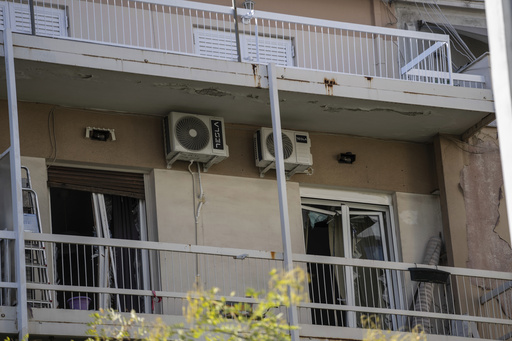
ATHENS, Greece — A recent explosion caused by an improvised bomb in a central Athens apartment has left one man dead and a woman severely injured. Greece’s Minister of Citizen Protection indicated on Monday that if the bomb had detonated at its intended target, the destruction would have been significant.
The blast occurred last Thursday in the Ambelokipi area, resulting in the destruction of a large portion of a third-floor apartment while also damaging surrounding units. Michalis Chrisochoidis, who oversees police matters in his ministry, shared that the local authorities have deemed the entire building uninhabitable due to the extensive damage caused by the explosion.
While the exact target and timing of the planned attack remain uncertain, the incident is under investigation by Greece’s anti-terrorism unit. Authorities conducting searches of the apartment wreckage, along with two other homes and a vehicle, recovered a range of items, including two handguns, ammunition, a variety of mobile devices, laptops, flash drives, handwritten notes, wigs, and full-face masks.
Chrisochoidis described the explosion as resulting from a “monstrous bomb filled with concentrated explosive material” during an interview on local television. He emphasized the bomb’s potential for widespread destruction, labeling it as extremely powerful.
The minister suggested that the individuals involved may be part of a younger demographic aspiring to emerge as a new wave of domestic terrorism in Greece. The man who died in the explosion was identified as a 36-year-old Greek national who was reportedly assembling the bomb at the time it detonated inadvertently.
In connection to the ongoing investigation, authorities have apprehended a 31-year-old male, as well as the 33-year-old female who was injured and is currently hospitalized under police supervision. Additionally, there is a search for a 30-year-old woman believed to have left the country prior to the explosion.
Chrisochoidis voiced concerns about the resurgence of young individuals aiming to form a new generation of extremist activities in Greece. The country has a longstanding history of far-left extremism, particularly through small urban factions. Although major extremist groups responsible for numerous assassinations from the mid-1970s to the early 2000s have been largely dismantled and their members imprisoned, smaller groups that carry out sporadic bomb attacks have been relatively dormant in recent years.
In another recent incident, police successfully defused a bomb planted at the headquarters of the national riot police after receiving a warning call from an anonymous caller who provided a 45-minute notice regarding the explosive device.
